Donald Trump’s die-hard supporters show no signs of straying
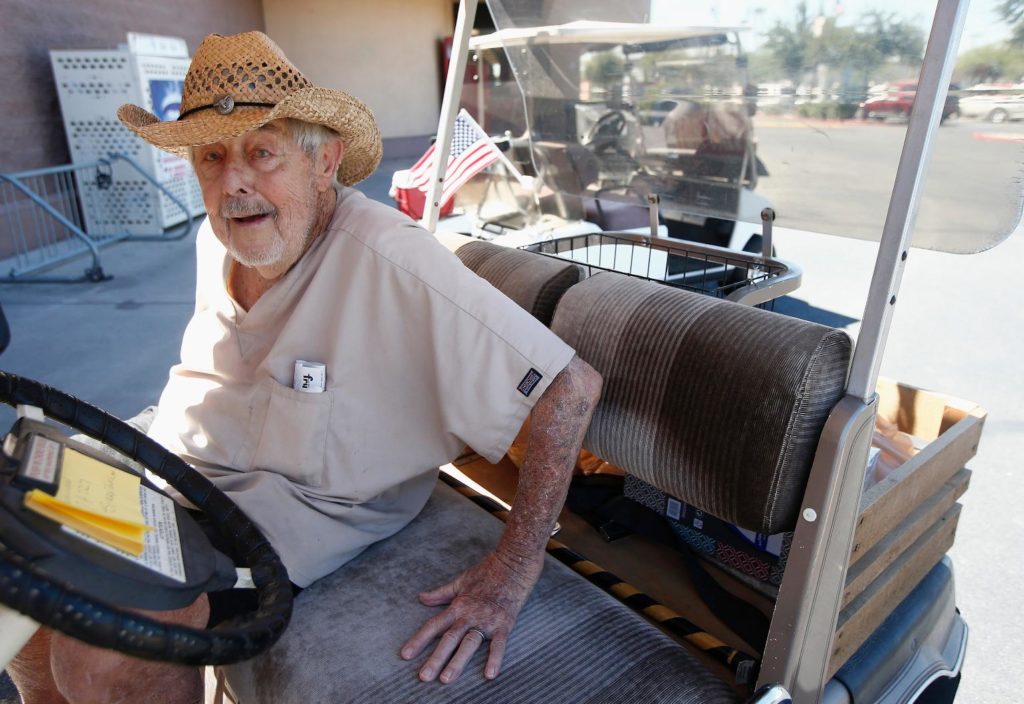
They wash their hands of neo-Nazis and wag their fingers at leftists. They denounce a press corps they see as biased and controversies they view as manufactured. But in the frenzied blame game over the deadly violence at a rally of white supremacists, Donald Trump‘s loyal base is happy to absolve the president himself. Even as Trump’s zig-zag response to the weekend bloodshed in Charlottesville, Virginia, has brought criticism from some Republican lawmakers, many men and women who helped put him in office remain unmoved by the latest uproar. “He has done nothing to turn me away from him,” said Patricia Aleeyah Robinson, of Toledo, Ohio. Robinson is black and her support of Trump has put her at odds with many in her life, costing her friendships and straining family relationships. But the 63-year-old retired truck driver sees the controversy over Trump’s response to Charlottesville as being driven by those seeking to disrupt his agenda and push backers like her away. She said she knows he pays no deference to racists and feels he is the only president who has ever spoken directly to blacks. She admires his refusal to sugarcoat his beliefs. Three hundred miles south in a Charleston, West Virginia, shopping mall, Joyce Ash took a moment to ponder Trump after buying a dress Wednesday to wear to the funeral for her husband of 33 years, who died of pancreatic cancer. The 71-year-old woman summoned nothing but support for the political novice who led her to ditch her lifelong support of Democrats. She recalled sitting up all Election Night to watch Trump clinch the win, and said nothing since made her reconsider her vote. “Let the president do his job instead of trying to take him out every time you turn around,” Ash implored. She didn’t follow the back-and-forth over Trump’s statements on Charlottesville but saw no reason to question him: “I believe in Donald Trump, I really do. I believe that if they would just give this man a chance, the economy, everything will start going better.” Though images of Nazi flags and men in white hoods sickened many Americans, the president’s most ardent champions saw no reason any of that should change their feelings for Trump. “You know why it doesn’t bother me? Because he is everybody’s president whether you like him or don’t like him. Everything he does, he’s doing it for our country,” said Patsy Jarman, a 70-year-old retired factory worker in New Bern, North Carolina. “And if you don’t like being here, you need to leave.” Such enthusiasm may be unsurprising in some ways. Trump himself boasted last year he “could stand in the middle of Fifth Avenue and shoot somebody and I wouldn’t lose voters.” Polls showed his approval ratings dipping even before this flare-up, and now some commentators are proclaiming a historic low point and late-night comedians have turned serious. But many Trump voters interviewed Wednesday showed no sign of moving away from him. In Florida, 50-year-old Steven Damron of Spring Hill said the president handled the Charlottesville situation well, and he agreed with Trump that “both sides” were to blame. In Iowa, Branden Nong, 35, of Waukee said that while he wished the president was more careful with his tweets or in his criticism of fellow Republicans, his vote was driven by economic issues, and he has been happy with Trump’s performance. And in Pennsylvania, 46-year-old substitute teacher Julie Horrell of Mohrsville said: “I am sticking by the president. It’s early in his term yet. He needs to get the time to dig in his feet.” Julie Brown, a 42-year-old real estate agent in Gilbert, Arizona, accused the media of twisting Trump’s statements on Charlottesville and said local officials did a bad job preparing for the protests. But she remains fully behind a president she sees as exactly the unpolished, authentic leader that the U.S. needs right now, and thinks of how her 4-year-old son will someday learn of this time. “He’s going to be reading in a textbook one day about the good and the bad that this president is going to do,” she said, “but I hope and I believe it’s going to be more good.” Republished with permission of The Associated Press.
Twinkle Cavanaugh switches from Governor’s race to Lieutenant Governor’s
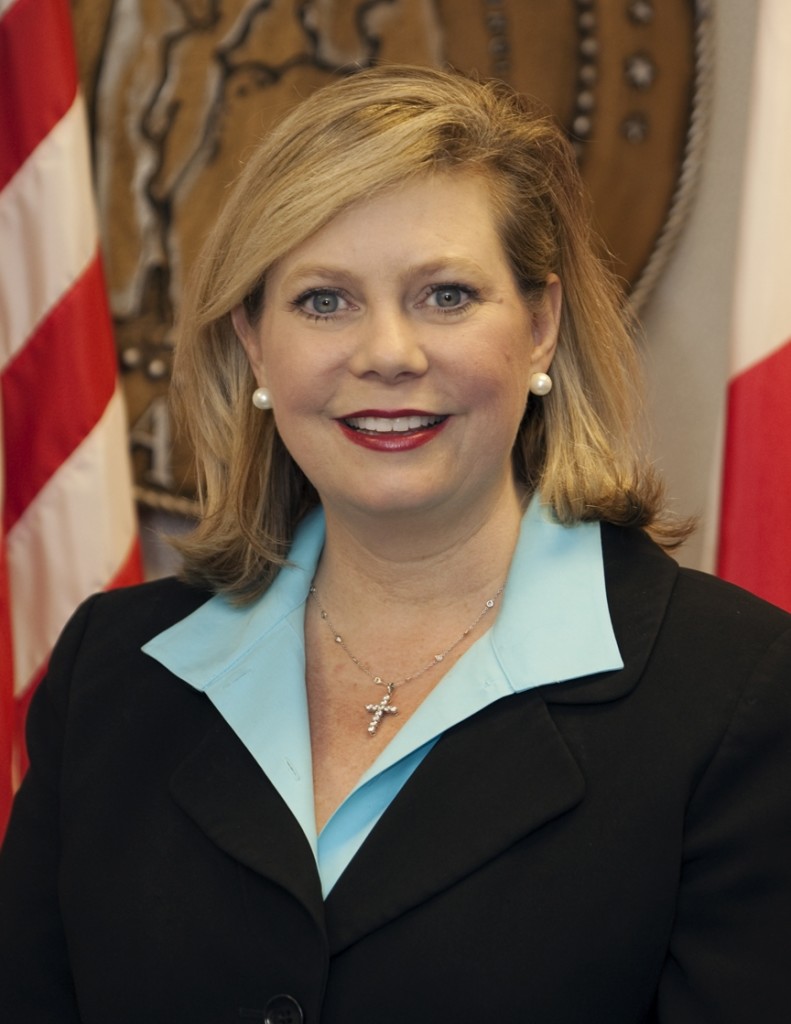
They say it’s the woman’s prerogative to change her mind, and that certainly seems to be the case with the president of the Alabama Public Service Commission Twinkle Andress Cavanaugh. Cavanaugh, a Republican, on Thursday announced she is no longer running for governor, but will run for lieutenant governor instead. Cavanaugh began to explore the idea of running for governor in January, when the state was plagued by scandal under former Gov. Robert Bentley. In March, she announced she would run for governor, but by April, Bentley had resigned and Gov. Kay Ivey had been sworn in. In the months that have followed, Cavanaugh says Ivey has “provided the leadership we needed to move our state forward” and thus, no longer feels she could best serve the state by running for lieutenant governor instead. While Ivey has yet to say if she running in 2018, there is growing speculation and expectation that she will. “At this time, I believe that I can best serve the people of Alabama not by running against Governor Ivey but by working with her to help enact real conservative reform as the Lieutenant Governor,” said Cavanaugh. “Brighter days are ahead, but we must push forward with strong, conservative leadership.” She continued, “It is important for our state to have an experienced conservative providing leadership in the Lieutenant Governor’s office. Alabama needs to see conservative solutions when it comes to jobs, the economy, infrastructure and rural broadband, education, eliminating government waste, and much more. It is time for Alabama to take charge of its own education system and produce a top-notch, trained workforce. With education as a priority, we will grow existing businesses and expand industrial recruitment. I look forward to continuing to lead on job creation in the Lt. Governor’s office.” Cavanaugh joins a crowded field of Republican hopefuls who are also seeking the post, including State Rep. Will Ainsworth, Sen. Rusty Glover and state Board of Education member Mary Scott Hunter. The lieutenant governor presides over the Alabama Senate.
Christian Cámara: No, white supremacists at Charlottesville were not ‘good people

There is much emotion on both sides of the current debate over race relations, even among people of good will. There are contentious questions to address, such as: should we remove Confederate statues? Should we allow racists to protest in public spaces? Are our elected leaders to blame for escalating tensions? Is one side more at fault for recent violence? I think these are all fair questions that good people might disagree on without necessarily making them “Fake News-Loving Commies” or “Nazi-Sympathizing Racists.” Thankfully, those two groups represent a tiny fraction of the population, but they unfortunately generate most of the coverage. Although I agree with much of the president’s response to Charlottesville, I fundamentally disagree with him on at least one statement: that there were good people on both sides. I believe there are many decent, non-racists who oppose the removal of Confederate monuments, and some might have very well attended to protest the removal of the Lee statue. However, it is hard to believe that any good person would have stuck around more than five minutes after noticing that an innocent event to protest the removal of a statue was actually a grotesque gathering of Nazi sympathizers, white supremacists and other malcontents. Therefore, I would take issue with the president’s assertion that there were “good people on both sides” that day. Good people on both sides of the issue? Yes. Present that day? No. I do, however, agree with him that elements inside the counter protest indeed included bad people looking to cause trouble: Antifa and other communist groups that likely instigated violence. Of course, the diabolical terrorist act of plowing a car into a crowd falls squarely on the driver and whoever else might have helped him. So as we look to address this escalating racial tension, decent Americans on all sides of this issue should agree to uphold certain principles. First, we must reject any assault on free speech. As detestable as these racist groups are, they have a constitutionally protected right to express their views—and yes, even their hate—so long as their actions don’t trample on other people’s rights through violence or other means. If they choose to live life hating others and expressing their hate, their right to do so trumps our sensibilities and our justified reaction to be offended by them. Indeed, I may not agree with one iota of what they’re saying, but I’ll defend their right to say and think it. However, with rights come responsibilities, and with responsibilities come consequences. They must also understand that, although we support their right to think and speak what they think, we regular Americans can and will exercise our right to condemn them for their vile views. That may include exposing and ostracizing them, though I do caution that we should be careful not to misidentify the innocent. But those who are accurately identified may be subject to public ridicule and contempt, and the repercussions thereof. Secondly, our elected officials, including President Donald Trump, need to exercise some moral clarity. There is no moral equivalence between a bunch of racist, Nazi-sympathizing white nationalists and those who protest them. Indeed, there were violent troublemakers within the counter protesters’ ranks. But to equate the entire diverse group of counter protesters to the overwhelmingly racist other side is just plain wrong. Likewise, Democrats and others on the left need to come down as hard on the violent communists as they do on the violent racists. In short, all sides need to come down hard on violence. No more sugar-coating or excusing why one side can be violent and the other side shouldn’t be. Finally, we all must adhere to the rule of law. Emotions cannot compel us to break the law. As much as some detest the existence of Confederate monuments and what they represent, we law-abiding Americans cannot and should not endorse or tolerate an angry mob destroying or vandalizing any property, much less physically assaulting people. Neither a constitutional republic nor its civil society can survive if the rule of law is replaced with mob rule. Debates can be had about what to do with Confederate memorials, and legislative bodies may elect to keep, remove or relocate them through normal deliberative processes. But to support or encourage angry mobs to enter and destroy property undermines the most basic tenets of a representative democracy governed by laws—not to mention that it would likely instigate the opposing side to retaliate unlawfully, thus escalating violence on all sides. As much as I utterly loathe racism, racists have a right to be racist, albeit peacefully and in such a way as it does not trample on other people’s rights. If we use the power of government—or worse, mob rule—to silence or crush undesirable thoughts, then we ourselves risk becoming just a different brand of fascists, but fascists nonetheless. ••• Christian R. Cámara is R Street’s Southeast region director and a senior fellow and co-founder of the institute. He previously was Florida director of the Heartland Institute’s Center on Finance, Insurance and Real Estate.
GOP Sen. Bob Corker says Donald Trump hasn’t shown stability, competence
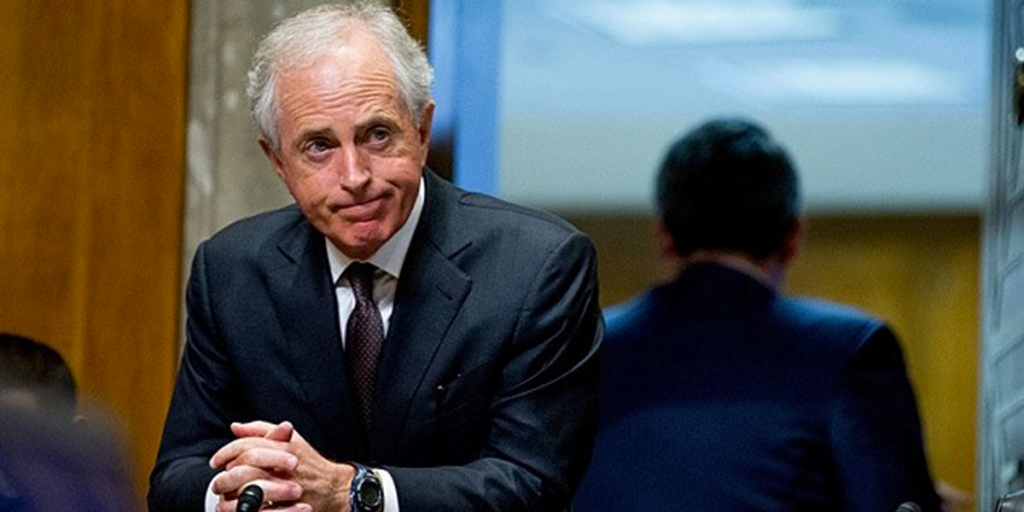
A prominent Republican senator delivered a stinging rebuke Thursday of Donald Trump‘s short time in office, declaring he has not shown the stability or competence required for an American president to succeed. Sen. Bob Corker of Tennessee, chairman of the Foreign Relations Committee, also said Trump “recently has not demonstrated that he understands the character of this nation.” During comments to local reporters after a speech to the Chattanooga Rotary Club, Corker called for “radical changes” in how the Trump White House operates. His remarks, which were posted on Facebook, came two days after Trump declared at a New York press conference that white supremacists don’t bear all the blame for the violence last weekend in Charlottesville, Virginia. The president’s remarks have triggered a firestorm of protest, with a number of Republicans criticizing Trump for giving weight to the complaints of white nationalists by refusing to definitively condemn them. Corker has sought to be a strong supporter of Trump’s, particularly on foreign policy matters. But Trump’s impulsive and often bombastic style has complicated the relationship for Corker and other congressional Republicans. A few months ago, following reports that Trump had disclosed highly classified information to a pair of Russian diplomats in the Oval Office, Corker said the White House was “in a downward spiral.” But Corker in recent weeks had largely declined to answer questions about Trump’s tweets or other political drama, telling reporters covering Congress that he was focused instead on matters of policy. He elected to weigh in Thursday, however. Noting that the country is polarized, Corker said, “Helping inspire divisions because it generates support from your political base is not a formula for causing our nation to advance, our nation to overcome the many issues that we have to deal with right now.” Corker said, “The world needs for our president to be successful,” and said he’s hopeful Trump will do what’s necessary to bring out the best in people, regardless of their political affiliations. Trump, he said, needs “to take stock of the role that he plays in our nation and move beyond himself, move way beyond himself, and move to a place where daily he’s waking up thinking about what is best for our nation.” Corker also defended his Republican colleague, Sen. Jeff Flake of Arizona. On Twitter Thursday, Trump called Flake “toxic” while praising his primary election opponent. Flake is “one of the finest best human beings I’ve ever met,” Corker said. He said the White House would be well served to embrace Flake because of his substance and character. Flake has a “conscience and is a real conservative,” Corker said. Republished with permission of The Associated Press.
Mo Brooks blames Donald Trump robocall for special election loss
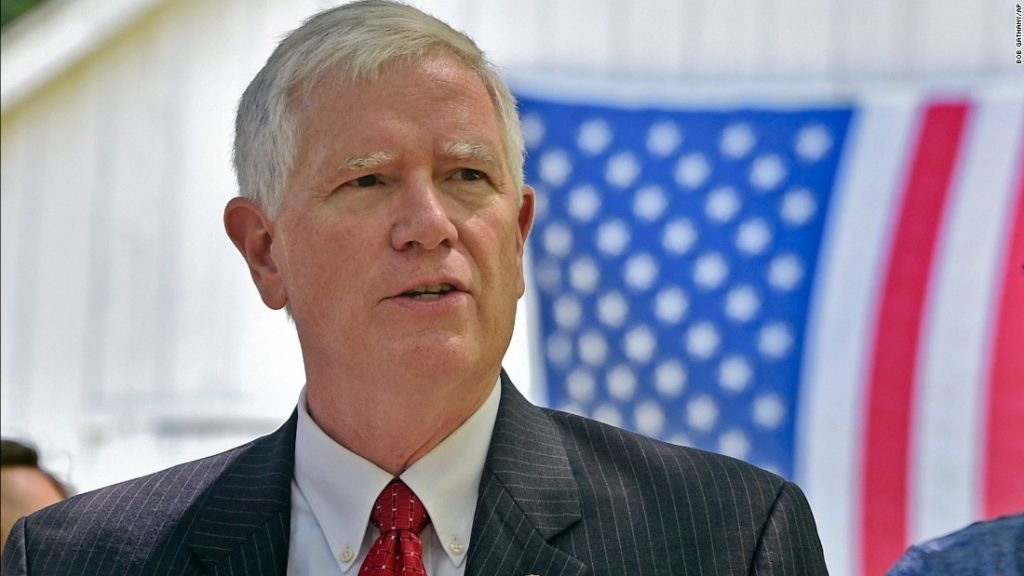
Republican U.S. Rep. Mo Brooks gave onlookers a window into his election autopsy via text after falling short in the Tuesday primary for Attorney General Jeff Sessions’ Senate seat. Brooks earned a little under 20 percent in the special primary, which put him in third place behind former Alabama Supreme Court Justice Roy Moore and sitting Sen. Luther Strange, who will face off in a Sept. 26 runoff election ahead of the Dec. 12 general. The House Freedom Caucus member texted journalists, lawmakers and GOP officials Wednesday with claims that his internal poll numbers showed him surging in front of Strange, who was appointed to the seat earlier this year by disgraced former Gov. Robert Bentley. He said President Donald Trump’s endorsement gave the former Alabama Attorney General a boost, but heading into the weekend before Election Day Strange’s lead had diminished to 2 or 3 points in his and other polls. He credits a robocall featuring a recording of Trump for turning the tide in the final 48 hours. “Over the weekend we caught back up. Then, on Monday and Tuesday, voters started getting a personal robocall from the President urging them to support LS. You can imagine the impact on a rural or elderly voter to hear PDJT calling! That final phone call caused LS to surge past us,” he wrote. Of course, Brooks said attack ads against him played a role, but maybe not in the way the Mitch McConnell-backed Senate Leadership Fund hoped. “Also, the nonstop LS/[Mitch McConnell] attack ads pushed anti-LS voters from me to [Roy Moore]. Hence, the final result. In the 5th Congressional District, we won 42 percent to 29 percent RM to 28 percent LS,” he added. McConnell’s political committee had spent more than $3.5 million on the race by the end of July, with much of that money being poured into ads attacking Brooks for not being supportive enough of Trump, who enjoys an 85 percent approval rating among Yellowhammer State Republicans. “An interesting note,” Brooks wrote in closing. “68% of Alabama GOP Primary voters rejected PDJT’s endorsement and voted against LS. Not yet sure what the national implications of that might be but we will find out.” Whis his Senate hopes dashed, Brooks announced that he will seek a fifth term in CD 5 next year. He has so far declined to endorse Moore or Strange in the Senate race.
Kay Ivey signs order, establishes Governor’s Office of Volunteer Services
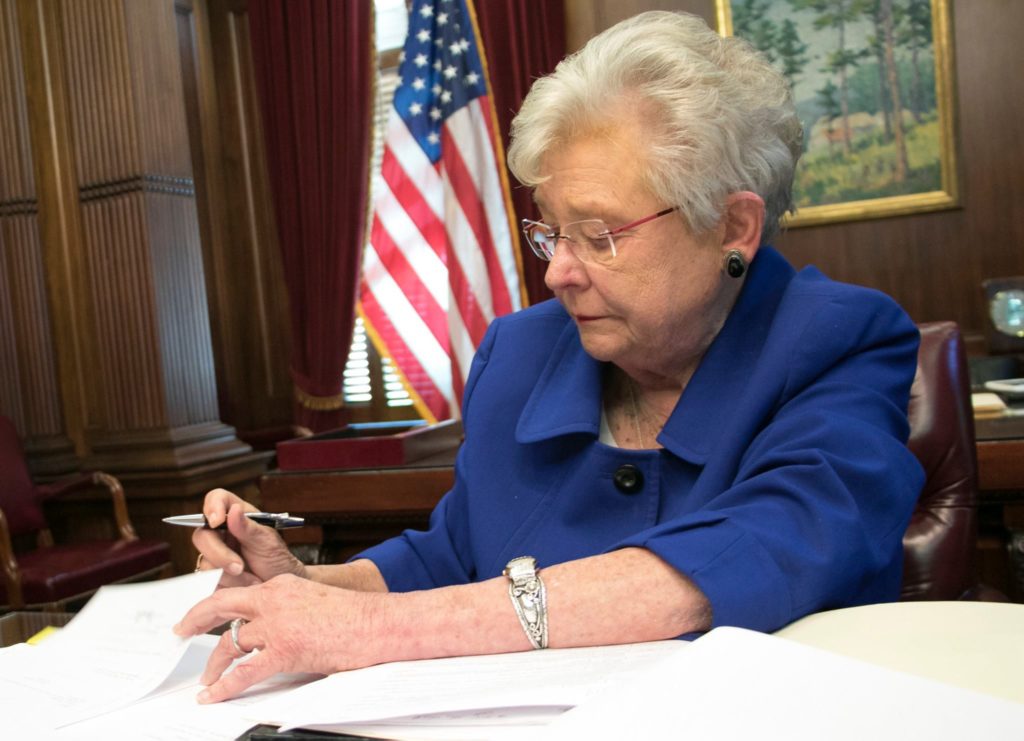
Governor Kay Ivey on Thursday abolished the Governor’s Office of Faith-Based and Volunteer Service (also known as Serve Alabama) and replaced it with Governor’s Office of Volunteer Services in an effort to end unnecessary duplication within the state’s agencies. Ivey signed Executive Order 709 establishing the new office, which will be within the Alabama Department of Economic and Community Affairs (ADECA). “It is my goal as governor to steady the ship of state and improve the image of Alabama, part of that entails ending unnecessary duplication of services within state agencies,” Ivey said. “I know that the Governor’s Office of Volunteer Services will work well in its new home at ADECA. Ivey appointed Lisa Castaldo as Coordinator for the Office, and she will report to Director Kenneth Boswell at ADECA. The new office will continue to serve as the operating agency of the Alabama Commission on National and Community Service and conduct its programs funded by the Corporation for National and Community Service (CNCS). “I appreciate Coordinator Castaldo and all of the staff for the incredible work they are doing and look forward to them being just as successful in the future,” Ivey added. These changes take effect immediately.
Trump’s first campaign manager Corey Lewandowski joins super PAC backing him
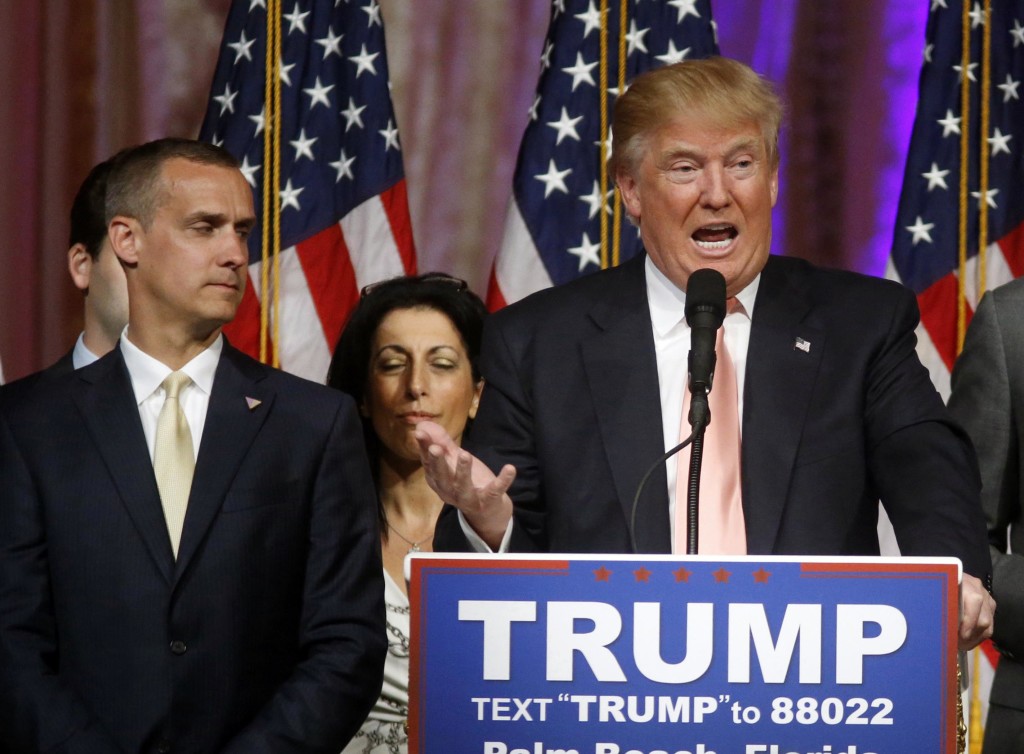
President Donald Trump‘s first campaign manager is joining a growing outside political effort dedicated to helping him. Corey Lewandowski will be a senior adviser and spokesman for a super PAC called America First Action. That group and a related nonprofit aim to boost Trump’s legislative agenda and the political candidates the president supports. “Like the president, Corey has a natural understanding of the needs of the American people, and I am excited to be working with him again,” Brad Parscale, another senior adviser to the super PAC and one of Trump’s 2016 campaign leaders, said in the announcement. Lewandowski led Trump’s unexpectedly successful Republican primary campaign. He left the campaign after assaulting a reporter and has recently been giving speeches and trying his hand at government influence. Becoming a super PAC adviser doesn’t preclude him from continuing to develop those other business interests. Lewandowski and Trump have remained close. The two frequently talk, and Lewandowski occasionally travels with him. That close relationship could prove a challenge for maintaining the necessary legal distance between Trump’s already operational re-election campaign and the super PAC. By law, candidates – who face campaign contribution limits – may not direct the spending of outside groups that can accept unlimited amounts of money from donors. However, loopholes abound in the rules about super PACs. One legal way that candidates and super PACs can “talk” was on display Thursday morning. Trump tweeted that Sen. Jeff Flake, an Arizona Republican who frequently tussles with him, is “toxic.” Flake faces re-election next year, and it’s clear from Trump’s tweets that he’s not in favor of him winning the Republican primary. It would be legal for the super PAC to take that as a cue to spend money defeating Flake. Republished with permission of The Associated Press.
Donald Trump’s die-hard supporters show no signs of straying
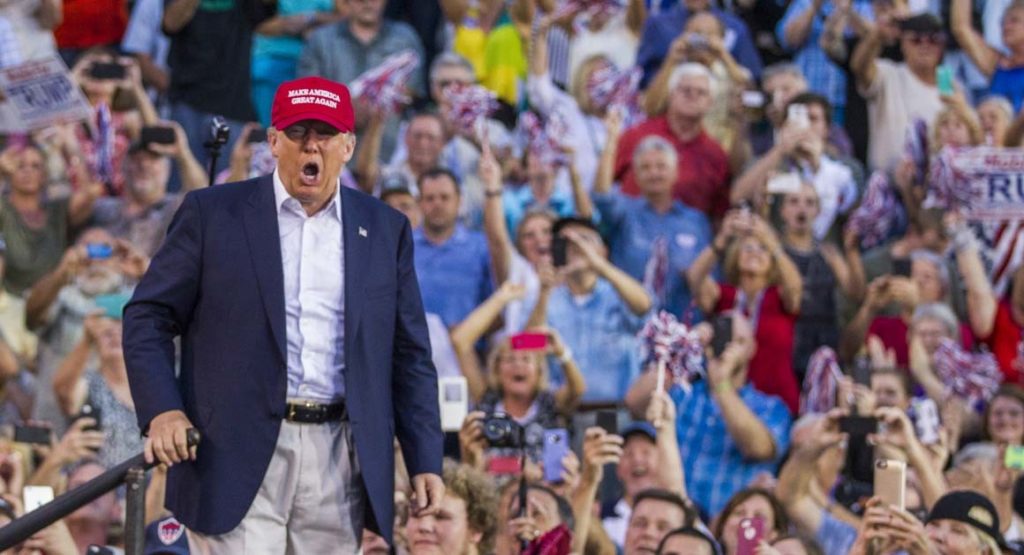
They wash their hands of neo-Nazis and wag their fingers at leftists. They denounce a press corps they see as biased and controversies they view as manufactured. But in the frenzied blame game over the deadly violence at a rally of white supremacists, Donald Trump’s loyal base is happy to absolve the president himself. Even as Trump’s zig-zag response to the weekend bloodshed in Charlottesville, Virginia, has brought criticism from some Republican lawmakers, many men and women who helped put him in office remain unmoved by the latest uproar. “He has done nothing to turn me away from him,” said Patricia Aleeyah Robinson, of Toledo, Ohio. Robinson is black and her support of Trump has put her at odds with many in her life, costing her friendships and straining family relationships. But the 63-year-old retired truck driver sees the controversy over Trump’s response to Charlottesville as being driven by those seeking to disrupt his agenda and push backers like her away. She said she knows he pays no deference to racists and feels he is the only president who has ever spoken directly to blacks. She admires his refusal to sugarcoat his beliefs. Three hundred miles south in a Charleston, West Virginia, shopping mall, Joyce Ash took a moment to ponder Trump after buying a dress Wednesday to wear to the funeral for her husband of 33 years, who died of pancreatic cancer. The 71-year-old woman summoned nothing but support for the political novice who led her to ditch her lifelong support of Democrats. She recalled sitting up all Election Night to watch Trump clinch the win, and said nothing since made her reconsider her vote. “Let the president do his job instead of trying to take him out every time you turn around,” Ash implored. She didn’t follow the back-and-forth over Trump’s statements on Charlottesville but saw no reason to question him: “I believe in Donald Trump, I really do. I believe that if they would just give this man a chance, the economy, everything will start going better.” Though images of Nazi flags and men carrying torches sickened many Americans, the president’s most ardent champions saw no reason any of that should change their feelings for Trump. “You know why it doesn’t bother me? Because he is everybody’s president whether you like him or don’t like him. Everything he does, he’s doing it for our country,” said Patsy Jarman, a 70-year-old retired factory worker in New Bern, North Carolina. “And if you don’t like being here, you need to leave.” Such enthusiasm may be unsurprising in some ways. Trump himself boasted last year he “could stand in the middle of Fifth Avenue and shoot somebody and I wouldn’t lose voters.” Polls showed his approval ratings dipping even before this flare-up, and now some commentators are proclaiming a historic low point and late-night comedians have turned serious. But many Trump voters interviewed Wednesday showed no sign of moving away from him. In Florida, 50-year-old Steven Damron of Spring Hill said the president handled the Charlottesville situation well, and he agreed with Trump that “both sides” were to blame. In Iowa, Branden Nong, 35, of Waukee said that while he wished the president was more careful with his tweets or in his criticism of fellow Republicans, his vote was driven by economic issues, and he has been happy with Trump’s performance. And in Pennsylvania, 46-year-old substitute teacher Julie Horrell of Mohrsville said: “I am sticking by the president. It’s early in his term yet. He needs to get the time to dig in his feet.” Julie Brown, a 42-year-old real estate agent in Gilbert, Arizona, accused the media of twisting Trump’s statements on Charlottesville and said local officials did a bad job preparing for the protests. But she remains fully behind a president she sees as exactly the unpolished, authentic leader that the U.S. needs right now, and thinks of how her 4-year-old son will someday learn of this time. “He’s going to be reading in a textbook one day about the good and the bad that this president is going to do,” she said, “but I hope and I believe it’s going to be more good.” Republished with permission of The Associated Press.
Campaign begins in Huntsville to remove Confederate monument
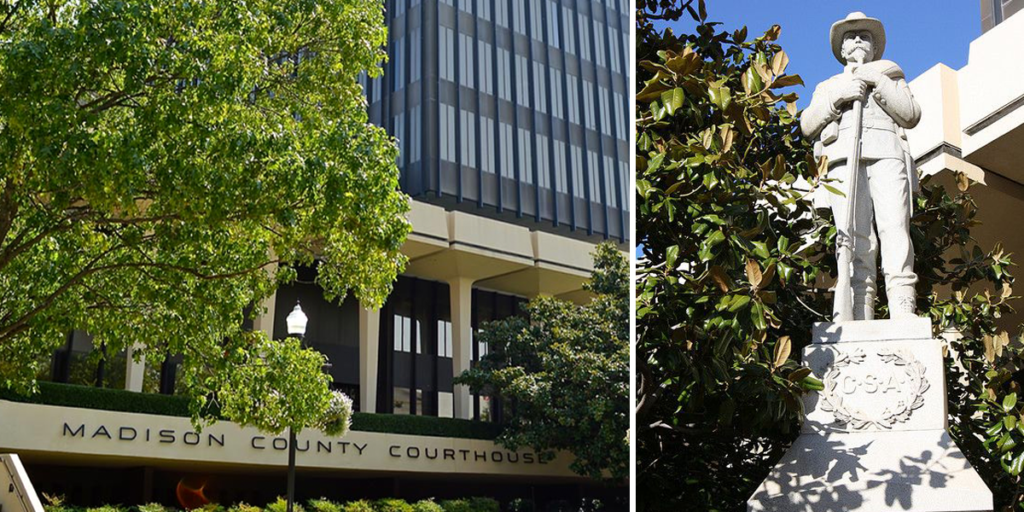
The weekend’s events — where violence broke out in Charlottesville, Va. during a demonstration by white nationalists and neo-Nazi groups opposed to the removal of a statue of Confederate Gen. Robert E. Lee — has prompted a national conversation on whether symbols of the Confederacy should be removed, and many monuments and statues have started to come down across the country. One of those monuments in question — the Confederate monument on the Madison County courthouse grounds in Huntsville, Ala. There, a local group is fighting for its removal. “This monument is in the center of downtown Huntsville, a forward-looking city with important ties to the federal government and two African-American colleges. Huntsville is proud to have been the first city in Alabama to integrate public schools and facilities. It’s completely unacceptable to honor ‘the principles which gave birth to the Confederate cause’ at the seat of our local government,” the Tennessee Valley Progressive Alliance (TVPA) wrote on their GoFundMe page where they’re working to raise funds in order to pay the $25,000 fine the state has set for those who violate the Memorial Preservation Act. The law, signed by Gov. Kay Ivey earlier this year, prevents the removal of historic statues more than 40 years old from public spaces. Under it , Alabama Attorney General Steve Marshall has the authority to fine the city $25,000 for each violation. Huntsville would be in violation of said law if the city removed the monument without Legislature approval. “Here is a small, concrete action you can take to join the fight against white supremacy right here in Madison County, AL,” TVPA wrote on their Facebook page linking to the GoFundMe campaign. At the time of publishing, they have raid $1,310 of their $2,000 goal.
White House: Government to make health law payments this month

The government will make this month’s payments to insurers under the Obama-era health care law that President Donald Trump still wants to repeal and replace, a White House official said Wednesday. Trump has repeatedly threatened to end the payments, which help reduce health insurance copays and deductibles for people with modest incomes, but remain under a legal cloud. A White House spokesman said “the August payment will be made,” insisting on anonymity to discuss the decision ahead of the official announcement. The so-called “cost-sharing” subsidies total about $7 billion this year and are considered vital to guarantee stability for consumers who buy their own individual health insurance policies. Insurers say they want to the administration to do more, and guarantee the payments at least through next year. But on Capitol Hill, a senior Republican applauded Trump’s move. “State insurance commissioners have warned that abrupt cancellation of cost-sharing subsidies would cause premiums, copays and deductibles to increase and more insurance companies to leave the markets,” said Sen. Lamar Alexander, R-Tenn., chairman of the Health, Education, Labor and Pensions Committee. “Congress now should pass balanced, bipartisan, limited legislation in September that will fund cost-sharing payments for 2018.” The Congressional Budget Office reported this week that premiums for a popular type of individual health care plan under the Affordable Care Act would rise sharply, and that more people would be left without options for coverage, if Trump kept his threat to stop the payments. Moreover, ending the payments would only increase federal deficits since it would trigger a rise in separate health law subsidies for premiums, wiping out any potential savings. The subsidies are snared in a legal dispute over whether the Obama health care law properly approved the payments to insurers. Adding to the confusion, other parts of the law clearly direct the government to reimburse the carriers. The disagreement is over whether the law properly provided a congressional “appropriation,” similar to an instruction for the Treasury to pay the money. The Constitution says the government shall not spend money unless Congress appropriates it. House Republicans trying to thwart the health law sued the Obama administration in federal court in Washington, arguing that it lacked specific language appropriating the cost-sharing subsidies. A district court judge agreed with House Republicans, and the case has been on hold before the U.S. appeals court in Washington. For months, Trump has been raising the prospect of terminating payments as a way to trigger a crisis and get Democrats to negotiate on a health care bill. After the GOP drive to repeal “Obamacare” collapsed, the president tweeted: “As I said from the beginning, let ObamaCare implode, then deal. Watch!” Trump elaborated in another tweet, “If a new HealthCare Bill is not approved quickly, BAILOUTS for Insurance Companies…will end very soon!” But with polls showing the public would blame Trump for “Obamacare” problems on his watch, congressional Republicans are not keen on going that route. It’s estimated that nearly 18 million people purchase individual health insurance policies. About half of them pay the full cost themselves and would risk the biggest disruptions from a spike in premiums. Republished with permission of The Associated Press.
‘Maniacal’ focus on China puts Donald Trump aide out of mainstream
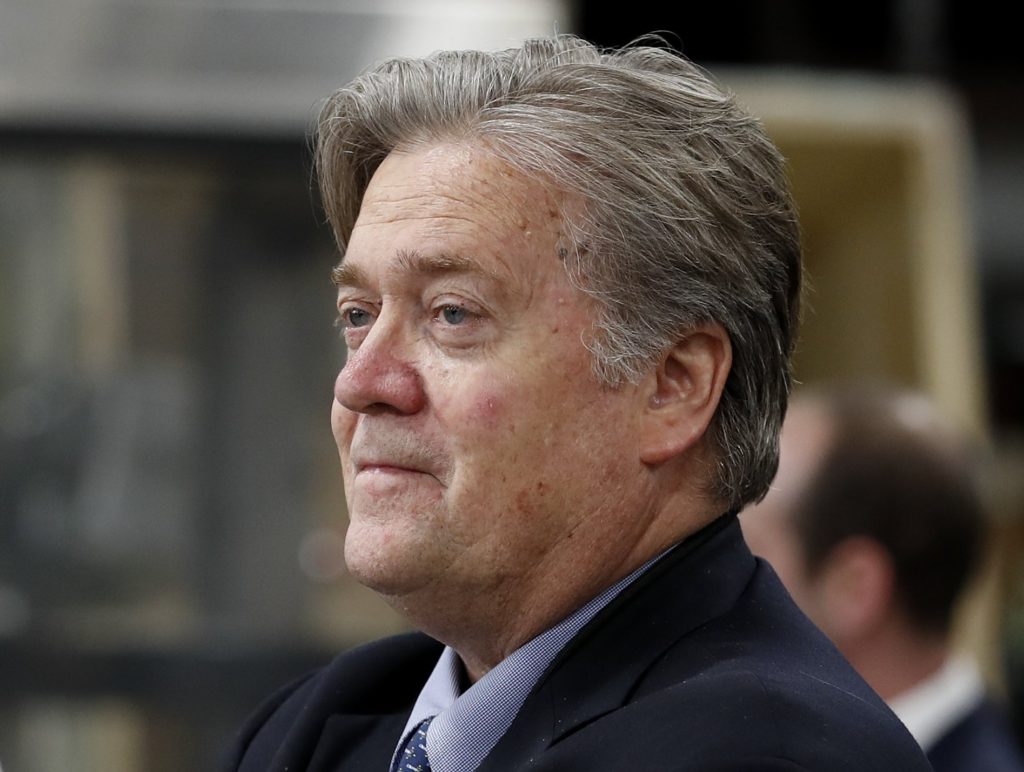
White House adviser Steve Bannon isn’t alone in pondering America’s possibly generation-defining question about China’s emerging superpower status – but his call for an “economic war” puts him far outside the mainstream. In an interview reflecting on some of his big-thinking projects, Bannon said the country should be “maniacally focused” on a confrontation with Beijing over who will be the global “hegemon” of the next 25 to 30 years. The former Breitbart News executive – who works steps from President Donald Trump in the West Wing – told The American Prospect that “the economic war with China is everything.” For decades, American economists, military strategists and policymakers of all stripes have wrestled with how the United States and China, the world’s biggest and soon-to-be biggest economies, manage differences on trade and security. But no one in a position of power has adopted a strategy that entails the almost messianic zeal of Bannon’s world view. For good reason, according to advocates of more measured approaches to dealing with China, who argue that an economic war would hurt everyone. “Steve Bannon’s view is too simplistic and arrogant,” Seattle trade attorney William Perry declared, saying such talk “could get the U.S. in big trouble.” He said Bannon’s position is “built around the idea that the United States is the biggest market in the world and everybody has to kowtow to us.” Bannon’s comments do reflect sentiments Trump himself has channeled on narrowing America’s vast trade deficit with China and bringing manufacturing jobs back home. They also underscore the ways in which the U.S. administration is in conflict with itself on China and other foreign policy issues. Bannon was stunningly candid about purging rivals from the Defense and State departments who supposedly resist the tough trade line with China. And he contradicted Trump by calling his boss’ bluff on threatening to attack North Korea, saying there is no military solution to the nuclear standoff. Bannon characterized the focus on North Korea as a “sideshow” to a more significant, U.S.-Chinese struggle for world control. Past U.S. administrations, Republican and Democrat, have cooperated with China since it initiated market-opening reforms more than three decades ago. The Clinton administration, for example, supported China’s World Trade Organization entry in 2001. But as China’s economic and military might has grown, hopes it would open its markets and play by WTO rules like other rising economies have receded. U.S. views have hardened. While American consumers have benefited from cheaper Chinese-made goods, the imports have caused massive U.S. trade deficits. Last year, for instance, America’s trade gap in goods with China was $347 billion. That represented nearly half the U.S. trade deficit with the entire world. Researchers from the Massachusetts Institute of Technology, the University of Zurich and the University of California, San Diego, found the U.S. lost 2.4 million jobs from 1999 to 2011 because of Chinese import competition. For Americans, that is the biggest concern and one Trump tapped into among blue-collar voters, at Bannon’s urging. Of his economic war with China, Bannon said: “We have to be maniacally focused on that. If we continue to lose it, we’re five years away, I think, ten years at the most, of hitting an inflection point from which we’ll never be able to recover.” Such doom-and-gloom talk may be getting Trump’s receptive ear. His administration has recently dusted off some little-used trade weapons, starting a process that could lead to penalties on Chinese steel and aluminum imports. On Monday, Trump announced the U.S. is investigating China for allegedly stealing American technology and intellectual property. But Bannon is surrounded by rivals for the president’s favor, clashing with top officials such as H.R. McMaster, Trump’s national security adviser. Trump himself passed up an opportunity this week to express confidence in Bannon, who has been with Trump since before the presidential election. Of The American Prospect interview, a White House spokeswoman on Thursday only said, “Bannon’s comments stand on their own.” An individual outside government who met recently with Bannon described him ordering up voluminous dossiers about China from various government agencies in recent weeks, possibly to prepare for Trump’s trade action this week. Trump’s announcement drew an angry reaction from Beijing, which also pushed back on Bannon’s remarks. Chinese Foreign Ministry spokeswoman Hua Chunyin called Thursday for “sound and steady growth of China-U.S. relations.” “There is no winner in a trade war,” Hua told reporters in Beijing. For years, China manipulated its currency to give its exporters an advantage over foreign competition. It demanded foreign companies turn over technology to access China’s vast market, and its firms rampantly stole the intellectual property of foreign companies. Government subsidies and cheap loans encouraged Chinese factories to overproduce steel, aluminum and other products, driving down global prices and putting U.S. and other firms out of business. But Washington hasn’t ignored violations. The Obama administration, for instance, filed 16 WTO cases against China. The U.S. has almost completely blocked steel imports from China. The Peterson Institute for International Economics found in a report this year that more than 9 percent of Chinese imports face trade barriers in the United States, versus less than 4 percent of overall imports. And China stopped manipulating its currency a few years ago. Bannon’s comments suggest potentially harsher measures. During the presidential campaign, Trump threatened 45 percent tariffs on Chinese imports, even if that would likely prompt Chinese retaliation. “The notion that we slap some tariffs on them, and they’re going to cave – that, I’m sure, is wrong,” said David Dollar, a former U.S. Treasury and World Bank official now at the Brookings Institution. Republished with permission of The Associated Press.


